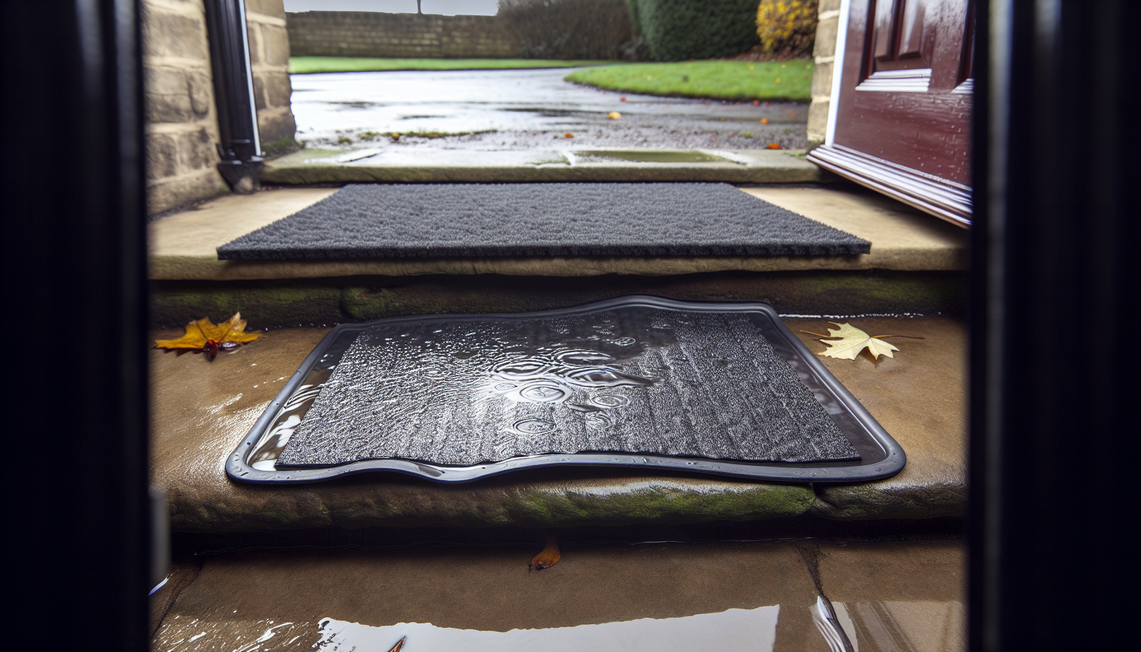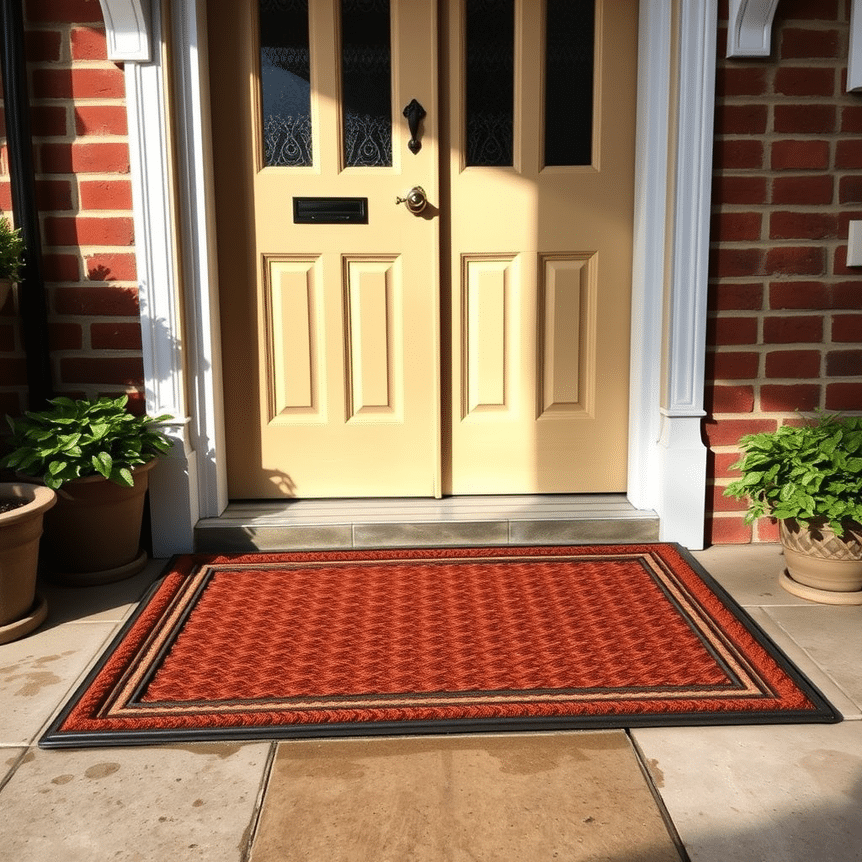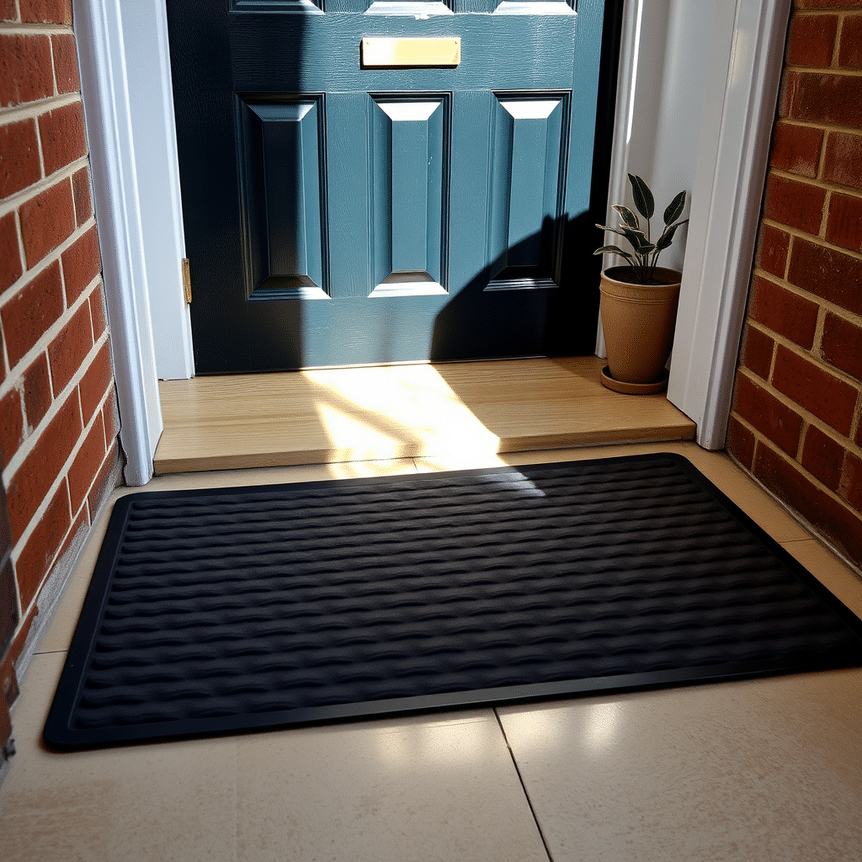When it comes to choosing the perfect door mat for your UK home, durability and performance matter significantly. The British climate is famously wet, cold, and changeable—qualities that put durable outdoor mats to the ultimate test. In this comprehensive post, we explore the critical differences between rubber and PVC backed door mats to help you make an informed decision about which will truly stand the test of UK weather and daily use, ensuring a long-lasting and effective welcome to your home.
Why UK Weather Makes Door Mat Durability a Challenge
The UK experiences an average of 156.2 wet days per year (Met Office data), with frequent rain, frost, mud, and significant temperature swings across all seasons. These challenging and unpredictable conditions demand weather-resistant door mats that are built to last and keep homes clean. Specifically, high-quality, long-lasting entrance mats for the UK must be:
- Waterproof and quick-drying to prevent moisture absorption, mould growth, and premature decay.
- Resilient against frost and temperature fluctuations, especially during harsh cold winters, to avoid cracking.
- Durable under constant foot traffic, effectively trapping dirt, grit, and moisture without degrading.
- Non-slip even when wet, providing crucial safety to prevent accidents on slippery doorsteps.
Outdoor mats must expertly handle these stressors year-round without curling, cracking, losing their grip, or becoming an eyesore.
Rubber and PVC Backed Mats Explained: Materials & Features
Understanding the core materials of your door mat’s backing is crucial for predicting its long-term performance and suitability for British weather. Here, we delve into the two primary types of door mat backing commonly found in the UK: rubber and PVC.
Rubber Backed Mats
Rubber backed mats feature a base layer made from high-quality natural or synthetic rubber compounds. Nitrile rubber, for instance, is especially popular for its wide temperature tolerance (-40°C to +108°C) and robust performance in demanding environments. This superior door mat material provides several key advantages:
- Heavyweight stability to prevent unwanted movement, curling, or shifting.
- Exceptional flexibility that actively resists cracking and curling, even in extreme temperatures.
- Inherently waterproof and highly chemical-resistant qualities, making them incredibly robust.
- Superior grip on various surfaces, offering enhanced safety and stability.
PVC Backed Mats
PVC (polyvinyl chloride) backed mats are constructed using a lighter, more rigid vinyl backing. These mats are often initially valued for:
- A lower upfront cost, making them seem more budget-friendly.
- Ease of manufacture in a wide variety of styles, patterns, and colours.
- Initial waterproof properties, which can diminish over time with exposure.
However, PVC inherently lacks the elasticity, toughness, and long-term resilience that rubber offers, significantly impacting their longevity and suitability for demanding outdoor use in the UK.
How Rubber Backed Mats Excel Through All UK Seasons
Rubber is often dubbed the ‘all-weather champion’ for excellent reason, making it the ideal choice for the best outdoor door mat in the UK. Its key strengths prove invaluable in challenging British conditions, making them the preferred choice for homeowners seeking heavy-duty door mats:
- Exceptional Waterproofing: Rubber naturally blocks water penetration and prevents absorption, which is essential for preventing dampness, mould, and associated issues like rot and unpleasant odours in your home.
- Superior Cold-Weather Flexibility: Unlike PVC, rubber remains supple and pliable even in frost and freezing temperatures, actively avoiding the cracks and brittleness common with other materials. This ensures it remains effective and safe throughout the winter.
- Outstanding Wear Resistance: Rubber-backed mats easily withstand heavy foot traffic, impacts, and the grinding grit and dirt brought in from outside, all without tearing, degrading, or losing their form. This makes them truly heavy-duty door mats perfect for high-traffic areas.
- Reliable Non-Slip Surface: The robust rubber backing consistently maintains a strong, secure grip on various surfaces, including wet, damp, or uneven doorsteps. This provides non-slip entrance mats that offer crucial safety and peace of mind.
- Chemical Resistance: Rubber is impervious to many common oils, detergents, and cleaning chemicals, contributing to its overall durability and ease of maintenance.
Investing in a quality rubber backed door mat ensures it reliably stays flat, safe, and visually appealing for many years, providing exceptional door mat longevity and value.
The Trade-offs of Choosing PVC Backed Mats in the UK
While PVC-backed mats may initially appeal for their low cost and wide array of styles, there are significant caveats when considering their performance in the unpredictable UK climate. Understanding these PVC door mat problems is crucial before making a purchase, especially if you’re looking for an outdoor door mat.
- Cracking and Peeling: PVC material hardens significantly in cold weather, leading to unsightly cracks, brittleness, and flaking over time. This makes them prone to damage and drastically reduces their effective lifespan.
- Limited Lifespan: The backing material deteriorates much faster under the UK’s wet, frosty, and varying temperature conditions compared to more robust options. This means more frequent replacements are needed.
- Increased Slippage Risk: The lightweight nature of many PVC door mats means they can easily shift, curl, or slide, significantly increasing the risk of slips and falls, especially on wet or uneven surfaces. This compromises safety.
- Discolouration and Brittleness: Prolonged sunlight (UV radiation) and continuous weather exposure can cause the material to become brittle, leading to fading, discolouration, and a noticeable loss of the mat’s initial resilience and aesthetic appeal.
- Higher Replacement Frequency: Due to their faster degradation, PVC-backed mats often need replacing multiple times sooner than their rubber counterparts. This can quickly offset any initial cost savings, making them less cost-effective door mats in the long run.
While PVC backed mats can be suitable for indoor use or in areas with very mild, protected conditions, they demonstrably struggle when exposed to the full rigours of outdoor UK weather, making them a less ideal choice for durability.
Side-by-Side: Performance Comparison of Rubber vs PVC Backings in UK Weather
To help you visualise the differences clearly, here’s a direct comparison highlighting how rubber and PVC door mat backings perform against key criteria in the challenging UK environment.
| Feature | Rubber Backed Mats | PVC Backed Mats |
|---|---|---|
| Durability | Up to 4 times longer lifespan, resists cracking and tearing, maintains integrity | Prone to cracking, peeling, and faster degradation; significantly shorter lifespan |
| Weather Resistance | Waterproof, frost-resistant, maintains flexibility in cold, UV-stable, prevents mould | Susceptible to brittleness, cracking, and peeling in cold/wet conditions; fades in sun |
| Slip Resistance | Excellent grip on various surfaces even when wet, stays firmly in place, enhances safety | Lightweight, can easily slip, curl, or move, increasing trip hazards and reducing safety |
| Maintenance | Easy-clean, resilient to many oils and chemicals, generally low-maintenance | Can degrade with harsh cleaners, requires more careful cleaning and vigilance for damage |
| Appearance Retention | Maintains colour, shape, and form over extended periods, looks new for longer | Fades, discolours, curls, and wears out visually much faster under outdoor exposure |
| Cost (Initial) | Higher upfront investment, but delivers significantly greater long-term value and savings | Lower initial cost, but less value due to frequent replacements and reduced lifespan |
| Environmental Impact | Generally more eco-friendly, especially natural rubber; longer lifespan reduces waste footprint | PVC production linked to higher emissions and disposal concerns; shorter lifespan leads to more waste |
Upfront Cost vs Long-Term Value: Which Mat Makes More Sense for Your Budget?
When selecting a door mat, it’s essential to look beyond the initial price tag and consider the overall door mat investment and true value for money. Although rubber backed mats typically come with a higher initial price, the evidence strongly suggests they offer superior long-term value, proving to be far more cost-effective door mats over time.
- Rubber mats last up to four times longer than PVC equivalents, providing sustained performance.
- The reduced replacement frequency translates to significantly less hassle and expense over many years, making them a wise long-term door mat solution.
- Maintenance costs tend to be lower due to rubber’s inherent resistance to damage, stains, and environmental degradation.
- The added safety from a stable, non-slip surface can prevent costly accidents and potential liabilities.
For many homeowners, investing upfront in a high-quality rubber backed mat like Rugstars’ rubber back entrance mat proves to be the most cost-effective and reliable choice for their UK home, offering both durability and peace of mind.
Caring for Your Door Mat: Maintenance Tips for Rubber and PVC Options
Proper maintenance is key to extending the life of any door mat, regardless of its backing material. While rubber boasts inherent durability, understanding the best door mat cleaning tips for both materials can help you maximise your investment and extend door mat life.
Rubber Backed Mats:
- Shake or brush loose dirt and debris regularly to prevent build-up.
- For deeper cleaning, you can hose it down with water and a mild soap solution; avoid harsh chemicals that could degrade the rubber.
- Dry in a shaded, well-ventilated area to prevent sun damage and ensure thorough drying.
- Avoid heavy folding or sharp bending to maintain the mat’s shape and prevent creases.
PVC Backed Mats:
- Clean spills and stains immediately to reduce the likelihood of permanent marking.
- Use gentle, non-abrasive cleaners; avoid strong solvents or bleach, which can accelerate degradation.
- If possible, store indoors during periods of extreme weather (e.g., severe frost, heavy rain) to protect the backing.
- Replace the mat as soon as cracks, significant curling, or brittleness develop to maintain effectiveness and safety.
While proper care will undoubtedly extend any door mat’s life, rubber’s inherent durability naturally makes its maintenance regimen simpler and less frequent, reinforcing its status as a low-maintenance door mat option for busy homeowners.
Making the Best Choice: Expert Tips for UK Homeowners Selecting Door Mats
To ensure you choose the perfect mat that meets your specific needs and stands up valiantly to the British climate, consider these expert tips, forming a comprehensive door mat buying guide for discerning UK homeowners looking for the best outdoor mats UK.
- Consider Your Climate: Given the prevalence of wet days and winter frosts in the UK, rubber backed mats provide the most reliable all-weather protection and are widely considered the best outdoor mats UK for challenging conditions.
- Think About Foot Traffic: For homes with frequent visitors, children, or pets, durability and superior non-slip qualities are absolutely vital for maintaining cleanliness and ensuring safety.
- Factor in Budget vs Longevity: While rubber may cost more initially, its extended lifespan offers significant real savings over needing multiple PVC replacements, making it a smarter long-term investment.
- Avoid Common Mistakes: Don’t settle for lightweight, thin PVC mats in outdoor settings—they are almost guaranteed to fail sooner, offering less protection and becoming a potential hazard.
- Choose Non-Slip, Heavy-Backed Options: Quality rubber mats are specifically designed to lay flat, resist movement, and stay put, ensuring safety even in the slipperiest conditions.
As home products expert Sarah Jenkins puts it, “We always recommend rubber backing for outdoor mats in the UK climate. Its inherent properties simply outperform alternatives when properly maintained, offering unparalleled durability and safety.”
Final Thoughts: Selecting a Door Mat That Stands Up to UK Weather Year-Round
Ultimately, choosing between rubber vs PVC backed door mats involves a careful weighing of upfront cost, long-term durability, crucial safety features, and overall value. For UK homeowners, the decision is clear: rubber backed door mats consistently outperform PVC options in terms of superior weather resistance, extended lifespan, and enhanced slip safety—solidifying their position as the smarter, more reliable investment for outdoor entrances. They are truly durable entrance mats UK residents can depend on, offering weatherproof door mats that last through every season.
Explore Rugstars’ premium rubber back entrance mat range today for stylish, hard-wearing mats designed specifically to thrive through Britain’s challenging weather, offering you years of dependable service and peace of mind. By prioritising durability, safety, and a robust construction with a quality rubber backed mat, you’ll secure a clean, welcoming, and accident-free doorstep, providing peace of mind no matter the UK season or weather.
Frequently Asked Questions (FAQs) About Door Mat Backings
Q1: Why are rubber-backed door mats considered superior for UK weather conditions?
Rubber-backed door mats excel in the UK’s famously wet, cold, and changeable climate due to their inherent waterproofing, flexibility in freezing temperatures (preventing cracking), superior slip resistance, and high durability against heavy foot traffic and grit. Nitrile rubber, in particular, maintains its integrity across a wide temperature range, ensuring the mat remains effective and safe year-round.
Q2: Is the higher initial cost of a rubber-backed mat justified by its longevity?
Absolutely. While rubber-backed mats have a higher upfront price, they offer significantly better long-term value. They typically last up to four times longer than PVC alternatives, meaning fewer replacements, less hassle, and greater overall savings over the years. Their durability and low maintenance make them a more cost-effective and sustainable choice.
Q3: What are the best cleaning and maintenance practices for a rubber-backed door mat?
Caring for a rubber-backed door mat is straightforward. Regularly shake or brush off loose dirt. For deeper cleaning, you can hose it down with water and a mild soap solution. It’s best to avoid harsh chemicals and to dry the mat in a shaded, well-ventilated area away from direct, prolonged sunlight to maintain its appearance and material integrity.
Q4: Can PVC-backed door mats be used outdoors in the UK?
While PVC-backed mats might be marketed for outdoor use, they are generally not recommended for exposed outdoor areas in the UK. Their lightweight nature can lead to slippage, and the material tends to harden, crack, and become brittle in cold, wet, or frosty conditions. They are better suited for sheltered outdoor areas or indoor use where they are protected from extreme weather.



